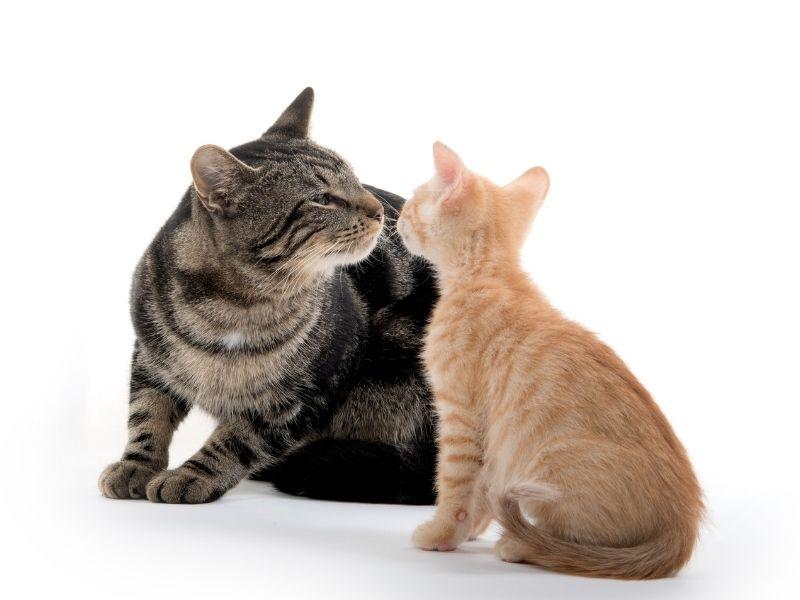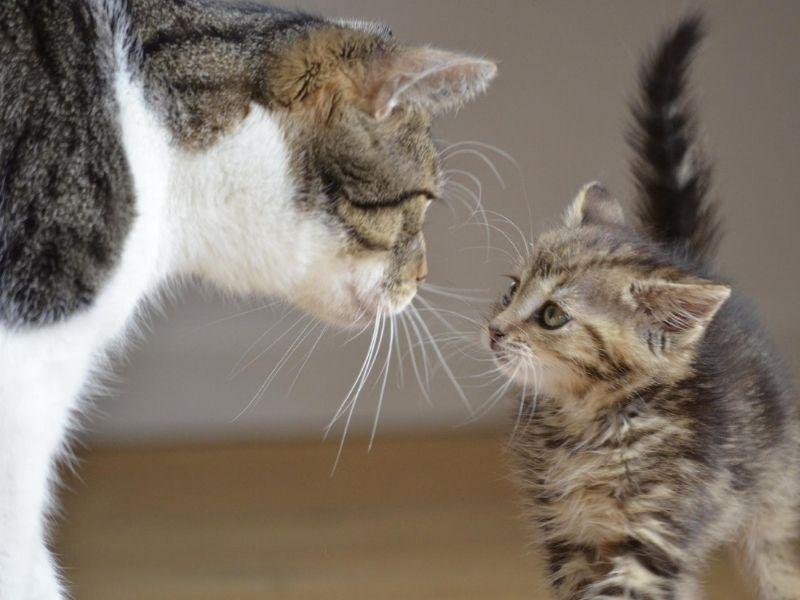The decision to bring a new kitten into your home is one that should not be taken lightly. In addition to the cost and commitment involved in caring for a pet, you must also consider how your current pets will react to the newcomer. If you have an older cat, you may be wondering if he or she will accept a kitten. Do not be worried as there are a number of things you can do to get the older cat ready for the new arrival. Pets, like us, can be somewhat territorial and they may need some time to adjust to the change in their routine.
How Do I Get My Older Cat to Accept a New Kitten?
There are a few things you can do to help your older cat adjust to the new kitten:
i) Introduce Them Gradually
When you first bring the kitten home, keep him or her in a separate room with food, water, a litter box, and toys. Allow your older cat to sniff under the door and get used to the new scent. After a few days, let the kitten out for short supervised visits. Gradually increase the amount of time the kitten spends with the older cat until they are comfortable with each other. Not introducing your cat gradually may result in your cat rejecting the kitten completely. This is because cats have a very strong sense of territory, and they will become extremely anxious if they are forced to share their home with another pet.
ii) Give Them Space
Another important thing to remember is that cats need space. Make sure the kitten has plenty of toys and things he or she can play with when you are not around. This will ensure that your cat does not feel threatened or territorial when the kitten is around.
iii) Be Patient
Give your cats time to adjust to each other. Do not force them to interact if they are not ready. Forcing them could result in aggression and may make it even harder for them to get along.
iv) Provide Positive Reinforcement
When you see positive behavior from your cats, make sure to give them lots of praise and attention. This will ensure that they continue to get along with each other in the future.
v) Consider Bringing in A Feline Behaviorist
If you are still having trouble getting your cats to get along, consider speaking with a feline behaviorist. They will be able to give you expert advice and tips that can help the two pets form a strong bond.

What Do I Do If My Cat Doesn’t Like My New Kitten?
If your cat is not adjusting well to the new kitten, there are a few things you can do to help him or her feel more comfortable. Here are a number of tips:
i) Create A Safe Space
Make sure your cat has a place he or she can go to get away from the kitten if needed. This could be a room in your house that is off-limits to the kitten or a cat tree that is tall enough for the kitten to not be able to reach.
ii) Give Them Time
It can take some time for cats to adjust to each other, so be patient. Remember that your cat is likely feeling territorial and may need some space. Do not rush him or her into interactions with the kitten if he or she seems anxious or scared.
iii) Communicate Clearly
If you notice that your cat is becoming aggressive towards the kitten, make sure to send a clear message that this behavior is not acceptable. This could involve scolding him or her, using a water bottle to spray, or making a loud noise (such as clapping your hands).
iv) Seek Help From a Professional
If you are still having trouble getting your cat to like the kitten, consider speaking with a professional. A feline behaviorist or animal behavior specialist can offer expert advice and tips that can help you create a positive bond between your cat and the new kitten.
See Also: Do Male Domestic Cats Help Raise Kittens?
And: Why Does My Cat Disappear for Days at a Time?
Will My Older Cat Hurt a Kitten?
Older cats may sometimes be rough with kittens, but this is usually not out of malice. It is important to supervise interactions between older cats and kittens, as the kitten could get hurt if the older cat gets too rough.
If you notice that the older cat is being too rough, make sure to intervene and stop the interaction. You can also try providing the kitten with toys or things to explore that are out of the older cat’s reach, which can help lessen his or her frustration and prevent aggressive behavior. Additionally, a feline behaviorist or animal behavior specialist may be able to provide you with additional advice and tips for helping your older cat get along with a new kitten.
Is It Better to Have Two Cats of The Same Gender?
It is not always a good idea to have two cats of the same gender, as this can sometimes lead to aggression or dominance issues. In general, it is best to introduce a new cat to your home gradually and allow them time to adjust before introducing a second cat.
If you do decide to get two cats of the same gender, make sure they are spayed or neutered and that you provide them with plenty of space, toys, and things to keep them occupied. You should also closely monitor their interactions and be prepared to intervene if necessary. If you have any concerns, it is best to speak with a professional beforehand. He or she will be able to provide you with expert advice on whether or not it is a good idea to get two cats of the same gender.
Your older cat may be open to the idea of accepting a new kitten, but it is important to take things slowly and give them time to adjust. There are a number of things you can do to help them get along, such as providing a safe space, communicating clearly, and seeking professional help if needed. In general, it is best to closely monitor their interactions and be prepared to intervene if the older cat gets too rough. Additionally, it is important to keep in mind that two cats of the same gender may not always get along, so be sure to take precautions if you do decide to get two cats of the same gender.
Featured image: Adult Cat and Kitten Meet

